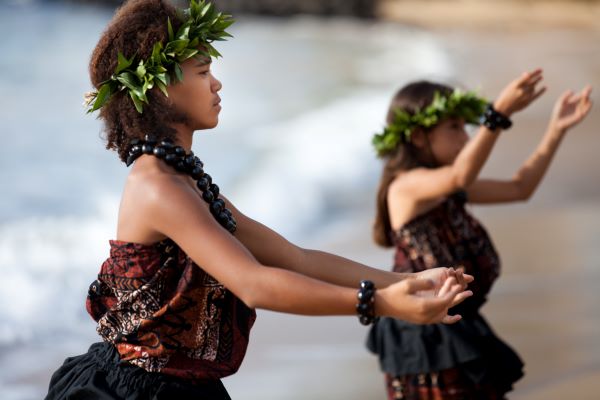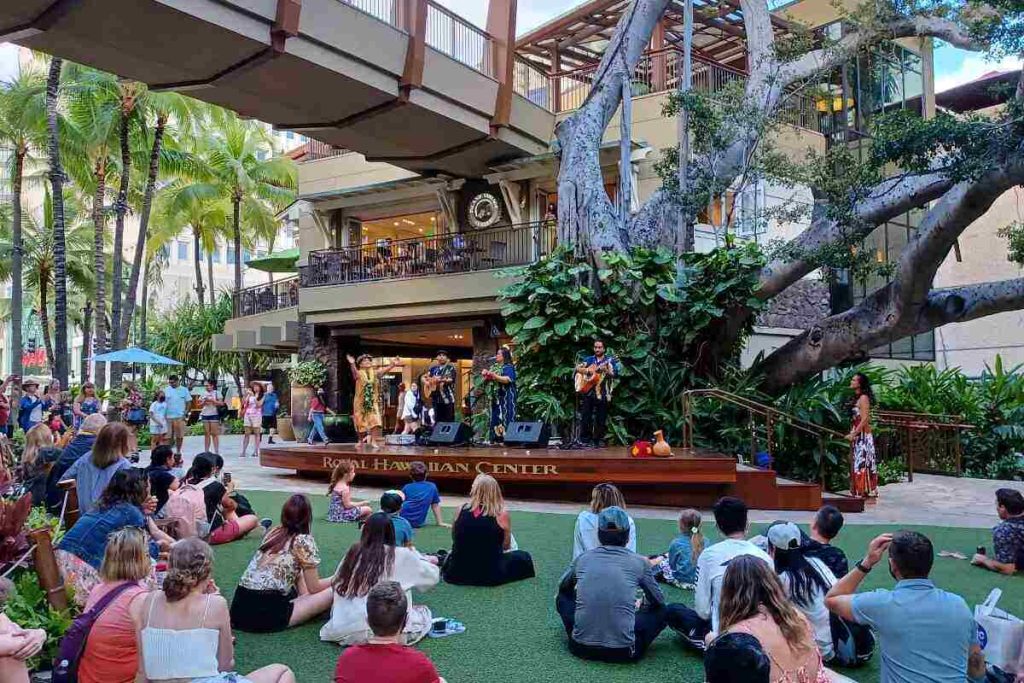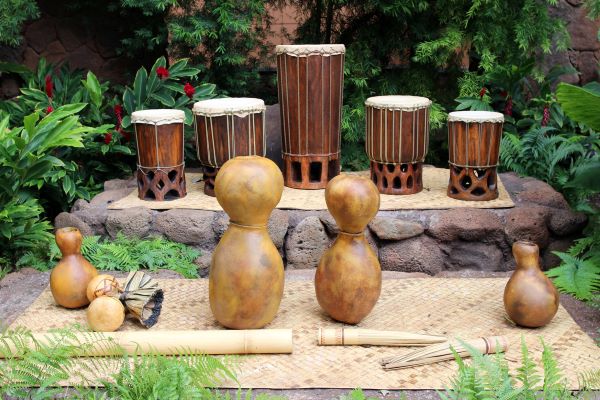Here is a very brief introduction to the indigenous Hawaiian dance known as hula. It is intended to give you an appreciation of the history of hula and an overview of its many forms.
We include a list of some of the major hula festivals throughout the year across Hawaiʻi, as well as free hula shows and demonstrations held in shopping malls and other locations.

Hawaiian hula dancers on the shore – DepositPhotos.com
What is hula?
Hula is a very complex dance form unique to the Hawaiian Islands. It is not to be confused with dance forms from other Pacific Island cultures often seen at a lūʻau show, such as Maori haka, Sāmoan fire dance, and Tahitian otea. You can see hula performed at festivals, lūʻau, shopping malls, and many other events and locations throughout the year across the Hawaiian Islands.
Historically, hula was—and still is—a storytelling method used by Hawaiians to pass down history and cultural traditions from one generation to the next. Hula was also used to entertain aliʻi (Hawaiʻi nobility), as well as for religious ceremonies, celebrations, and other important events.
Traditional hula is precise and often graceful, although it can also be a very powerful form of expression. There are basically two types of hula: hula kahiko and hula ʻauana. However, there are many styles and variations within these two broad categories. Either way, hula is always performed barefoot. (Okay, not always. Hula ʻauana performers sometimes wear shoes). Read more about the different types and styles of hula below.

The Maori Haka Dance is indigenous to New Zealand. This dance, along with other Oceanian and Polynesian dances often performed at luau shows are not to be confused with Hawaiian hula. – DepositPhotos.com
Haʻa Koa “Dance of the Warrior”
Haʻa Koa translates to “Dance of the Warrior” and pre-dates hula. Haʻa means “a dance with bent knees” and koa means “brave” or “fearless”. It is commonly called the “bent-knee dance”. However, Haʻa Koa is not a particular dance, rather refers to an ancient style of dance performed by kāne (men). It celebrates the spirit of the ancient koa (warrior), as well as the spirit of aloha and other traditional Hawaiian virtues, including koa (courage), lōkahi (harmony), kupaʻa (allegiance), and mana (divine power). It is uniquely Hawaiian in language, movement, ʻike (thinking), and mana (spiritual power).
The traditions of Haʻa Koa have been lost but organizations today are working to re-establish the dance form. It is not as widely known or performed as hula, but Haʻa Koa is an important component of Hawaiian culture.
Hula Kahiko
Traditional hula kahiko is the more ancient form of hula. It may be performed by men or women. This type of hula is accompanied by an oli, which means “chant” in the Hawaiian language. As with music everywhere, there are many of kinds of chants: love chants, chants to celebrate, to express grief, for prayer, to recite genealogy, and many other purposes.
Oli are generally of two types: mele oli (chants without accompaniment) and mele hula (dancing songs).
- Mele oli are performed by one individual without accompaniment (neither instrument or dance). A hula festival and other events (first day of school, etc.) may open with a mele oli.
- In contrast, mele hula are performed by groups and accompanied by percussion instruments. A mele hula can speak of actual events or be filled with imagery and kaona—double meanings that can be interpreted differently depending on who is listening.
Hula kahiko dancers dress in earth tones and are adorned only with greenery, such as ferns or other native plants. The mele hula is set to the beat of a percussive instrument, such as an ipu heke (a double gourd drum).
Schools teaching this traditional form of hula are called hālau. Hula kahiko is taught with dedication and discipline to be performed in exactly the same way each time, preserving the history and stories as originally intended. There is no improvisation in hula kahiko. However, there are also new mele and hula being composed today.
In the YouTube video below you can see an example of hula kahiko. This YouTube video features kāne (men) performing hula kahiko at the 2019 Merrie Monarch Festival in Hawaiʻi. Notice the traditional kapa garments (also known as “tapa”, a cloth made from trees).
Hula ʻauana
Hula ʻauana is the more modern dance form and means “to wander”. This style of hula may be performed with lyrical songs in English or Hawaiian and accompanied by melodic musical instruments such as the ʻukulele or steel guitar.
Costumes and adornments are colorful and varied. There have been cellophane and raffia hula skirts, muʻumuʻu and holokū (a elegant muʻumuʻu with a long train), and ti leaf skirts with colorful tops, to name a few variations.
The following YouTube video provides an example of a hula ʻauana. This YouTube video features wahine (women) performing hula ʻauana at the 2019 Merrie Monarch Festival in Hawaiʻi. Compare the song and instrumentation with the more traditional kahiko form.
Where to see hula in Hawaiʻi
Listed below are some of the free public hula shows occurring regularly around the Hawaiian Islands. Find these and other upcoming hula shows and competitions in our calendar list below.
Free Hula Shows
Hawaiʻi: Queens’ Marketplace Hawaii Resort free one-hour hula show every Wednesday at 6PM in the Coronation Pavilion performed by local hālau features both kahiko (traditional) and modern hula. Experience the dancers up close and personal as they perform this intricate ancient art of dance and chant in a comfortable outdoor setting. More info: Queens’ Marketplace Event Calendar at Waikoloa Beach Resort (queensmarketplace.com)
Hawai’i: The Volcano Art Center regularly hosts hula performance as well as many other classes and workshops. More info: Hula Arts | Volcano Art Center
Oʻahu: Ala Moana Shopping Mall free Hula Shows feature both kahiko (traditional) and modern hula daily on Centerstage. More info: Events at Ala Moana Center
Oʻahu: Royal Hawaiian Shopping Center free hula performance and many other cultural performances in The Royal Grove. More info: Events at Royal Hawaiian Center
Oʻahu: The Kilohana Hula Show at the Waikīkī Shell is a modern reimagining of the classic hula shows of Waikīkī. The FREE show takes place every Sunday through Wednesday mornings. More info: Experience Kilohana | Authentic Hawaiian Experience in Waikiki
Oʻahu: Free hula show at Kūhiō Beach Hula mound in Waikīkī takes place on the only authentic pa hula (hula mound) in Waikīkī, which was dedicated in a traditional Hawaiian ceremony. Hawai‘i’s finest hālau hula (hula schools) and Hawaiian performers open each show with the traditional blowing of the conch shell. Free, outdoors, casual, seating on the grass; beach chairs, mats, etc. okay. Cameras welcome. Schedule: Tuesdays and Saturdays 6:30-7:30 pm. Shows will cancel for parades, street fairs, and bad weather. More info: KUHIO BEACH HULA SHOW (kbhulashow.wixsite.com) and Events — Waikiki Improvement Association.
The venue is located on Waikīkī Beach, between Uluniu and Liliʻuokalani Avenues, makai (oceanside) of the large banyan tree. The pau hula is defined by a lava rock wall with a large performance area. Paid parking is available a few blocks away, on the streets surrounding Kapiʻolani Park or at the Honolulu Zoo on Kapahula Avenue.
Another place to see hula are at annual hula competitions and festivals. Scroll down for some of the major hula festivals throughout Hawaiʻi.

Hula show at Royal Hawaiian Center Grove – 2022 photo by Carole Cancler
Hula Festivals in Hawaiʻi
Merrie Monarch Festival
Merrie Monarch Festival is Hawaii’s premier hula festival. Since 1963, the week-long festival in Hilo has been a showcase for the perpetuation, preservation, and promotion of Hawaiian culture. Through this festival, thousands of people at home in the islands and throughout the world can learn about the history and culture of Hawaiʻi.
The highlight of the festival is a world-renowned three-day hula competition featuring some of the best hālau hula (hula school) from Hawaiʻi and the continental United States. When: spring. Ticket request forms are usually accepted starting in December. More info: Merrie Monarch Festival
- Merrie Monarch Festival: March 31 – April 6, 2024.
- Merrie Monarch Hawaiian Arts & Crafts Fair: April 3-6 2024, Wed-Fri 9 AM – 5 PM, Sat 9 AM – 4 PM. E hele mai a kāko’o. Support over 150 of Hawaiʻi’s best artisans and crafters.
Kamehameha Festival
Kamehameha Festival is part of the Kamehameha Day celebration that was established in 1871 as the national holiday of the Kingdom of Hawaiʻi. Kamehameha Day pays tribute to Kamehameha the Great (c. 1758-1819), Hawaii’s first King who united the all of the Hawaiian Islands in 1810.
The Festival serves to protect, preserve, and perpetuate Hawaiian culture. It features traditional Hawaiian dance, chant, culture, arts & crafts, and of course food. When: June 11, also known as Kamehameha Day on Mokuola (aka Coconut Island) in Hilo. More info: Kamehameha Festival
- The 2020-2023 Kamehameha Festivals were cancelled due to lack of funding from the State of Hawaii.
Nā Hula Festival
The Nā Hula Festival has celebrated the artistry and grace of Hawai‘i’s premiere dance form since its creation in 1940, when City & County of Honolulu Department of Parks & Recreation (DPR) kumu hula (hula instructors) did a hō‘ike (showcase) of their haumāna (students). This tradition has continued every year, making Nā Hula Festival the longest-running, annual, non-competitive hula event in Hawai‘i. Nā Hula Festival is a free, family friendly event that is open to the public. Be sure to bring your hāli‘i (covering, spread) and mea ‘ai (food) to help enjoy a beautiful, relaxing day of hula at Kapi‘olani Park!
2024 Nā Hula Festival
Sunday, August 11, 2024 from 9am-2pm. More info: 83rd Annual Nā Hula Festival (honolulu.gov)
Prince Lot Hula Festival
Moanalua Gardens Foundation (MGF) has presented the Prince Lot Hula Festival since 1978. It is Hawaii’s largest non-competetive Hula Festival. The festival honors Prince Lot Kapuāiwa, who helped reprise hula in Moanalua and reigned as Kamehameha V from 1863 to 1872. More info: Prince Lot – Moanalua Gardens Foundation
MGF is committed to preserving and perpetuating the native culture and environment of Hawaiʻi through stewardship of Kamananui Valley and celebration of the Prince Lot Hula Festival. When: 3rd week of July.
2024 Prince Lot Hula Festival
47th Annual Prince Lot Hula Festival taking place on Saturday, July 20, 2024, 9 am to 4 pm, at the Frank F. Fasi Civic Center Park in Honolulu, Hawai’i. Hawaiʻi’s largest non-competitive hula celebration.Free event, the entire community is invited to enjoy a day of spectacular hula and activities. More info: Prince Lot Hula Festival | MGF Facebook
Where to learn hula
Like any other art form, learning hula takes years of practice that includes ʻōlelo makuahine (literally “Mother tongue”) or ʻŌlelo Hawaiʻi (Hawaiian language). Hula is taught at hālau hula (hula school) by a kumu hula (hula teacher). There are many different schools and each one establishes the requirements for practice, language study, performance and events, costume making, and other aspects of hula. If you are serious about hula, there is a school for you.
For serious study, first you must find a hula hālau (hula dance school) that is accepting new students. Some restrict classes to girls (kaikamā.hine) and women (wāhine), or boys (kama kāne) and men (kāne). Some offer classes for keiki (children) to kupuna (seniors). To find a hālau, talk with hula performers at festivals and other events, or of course search online for a hālau near you or in your city or on your island.
Visitors to Hawai’i often state they would like to learn hula. Of course, serious study is not possible during a short stay. However, there are a number of opportunities to learn a few basic hand gestures, along with some footwork and put it together to tell a story. We regularly search for visitor classes and put them on our Hula event calendar below. Some of the major hotels offer a free hula demonstration or short workshop, check with your concierge.
To get started where you are, listed below are Hawaiian resources for hula lessons online or DVDs (free and paid):
- Hawaiian Hula Tutorials (hawaiianhulatutorial.com)
- Ihula Hawaii (ihulahawaii.com)
- RealHula (realhula.com)
- Virtual Hula Lessons & Entertainment (hawaiihulacompany.com)

Hawaiian percussion instruments photo by VickyRu via iStockPhotos by Getty Images
Event calendar of free and affordable things to do
Listed below are all types of free and affordable things across the Hawaiʻi Pae ʻĀina.
Featured Events are listed first each day, highlighted by a photo. These are unique, popular, or annual events that we or our advertisers don’t want you to overlook.
More info: Hawaiʻi on the Cheap – affordable living and things to do (hawaiionthecheap.com)
Kapiʻolani Park, 3840 Paki Ave, Honolulu, HI 96815
Kuhio Beach Pa Hula, 2441 Kalakaua Ave, Honolulu, HI 96815
